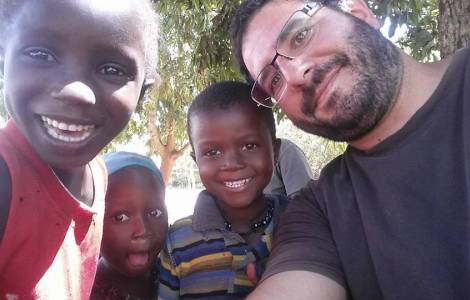
by Fabio Beretta
Bigene (Agenzia Fides) - Bad roads, tropical temperatures, and among the woods small villages of huts surrounded by fields of rice, mango and cadjù. This is the corner of the world where a group of missionary nuns, belonging to the Congregation of the Oblate Sisters of the Sacred Heart of Jesus, have lived and worked for over thirty years, flanked by some fidei donum priests from the Archdiocese of Foggia-Bovino.
It was Settimio Ferrazzetta, the first bishop of Guinea Bissau after gaining independence, who proposed to the Oblate Sisters to start a mission in virtue of their charism, dedicated to collaborating with priests in the service of the new particular Churches.
The mission was born in 1991 in Bigene, a village located in the north of Guinea Bissau, near the border with Senegal, 40 km from the city of Farim and 30 km from Ingorè. Today, the mission territory comprises about fifty villages spread over 300 square kilometres. Of these, only about twenty are inhabited by Christians. The rest are mostly inhabited by Muslims or animists.
"We call them Christians - says Father Marco Camilletti, a Fidei Donum missionary of the Archdiocese of Foggia-Bovino, who has been carrying out his ministry in Bigene for several years, to Fides - but many of them have not yet been baptiZed. However, they participate in catechism, they pray, they take part in the Eucharistic celebration".
To receive baptism, explains the priest, "the journey takes seven years. And during this time, when we organize catechism, many leave their work in the fields during the day to listen to us. Someone always comes, even during periods when work is more intense. There are those who help us in the parish, or who call us to say a prayer when someone dies, even if the family is not Catholic...".
The path to baptism is long, but the number of baptized people continues to grow. "A little over ten years ago," says Fr. Marco, "in the parish of Bigene there was only one family married in the church. Very few, four or five, took communion. Today we can say that many young people, children of Christians, participate in the liturgical and pastoral life of the parish, even though some of them cannot receive the sacraments because they are polygamous."
Father Marco recalls what he calls a “mega-ceremony” held in 2014 on the day of Pentecost: "In the same celebration we had about thirty baptisms, several first communions and confirmations of young people and adults, as well as five weddings. There were so many of us that there were no churches large enough to hold us. So the rites of the various sacraments were celebrated outdoors, in the woods, in a clearing among the palm trees."
In recent years, some vocations have also flourished in the villages of the parish: "At the moment," says Fr. Marco, "there is a girl, Francisca, who is being trained by the nuns. There is also a boy who has entered a congregation of religious men."
Entering the seminary, the missionary points out, is complicated by the problem of low schooling: "Seminaries require a high level of education, but in Guinea Bissau not everyone reaches secondary school. Families are interested in their children knowing how to read and write. Then they have to work in the fields."
However, there are many signs that suggest that we are also experiencing a “sowing time” for priestly and religious vocations: "There are many boys and girls who are embarking on a path of formation. Few continue, many abandon it because they realize that it is not for them. A group has also emerged around a vocational centre dedicated to teenagers. It is the beginning of the journey."
The apostolic work carried out by the missionaries does not seem to rely on sophisticated means or planned strategies. "Personally," says Fr Marco, "I have never gone around announcing catechism courses in villages where no one knows what it is about. It is usually the villagers themselves who come to call us when one of them hears about our work and our prayers. The reason is simple. They think: 'They help everyone, they will help us too.'” Then everything happens according to the mysterious and surprising dynamic with which grace acts: "Over time, someone leaves, someone stays. And someone asks to be baptized."
To present the person of Jesus to the African peoples of the 21st century, comments Fr Camilletti, "we start from zero, from a-b-c: the sign of the cross. That is the starting point." "Then there are the Gospel stories that arrive over time, slowly, together with those of the Old Testament. They are simple stories that many of them already know in a certain sense." Fr. Marco gives the example of Creation: "If I tell you that God created the world, you understand it because everyone recognizes it, even the animists. The novelty is Jesus, who brings salvation".
Christian novelty is proposed by adapting to the practices and values of the local culture: "We do not erase their culture," the missionary stresses, "but we take elements and examples from it to communicate the Gospel, so that it is understood and welcomed. For example, when they set out on a journey, they pour water or wine on a rock and recite a prayer to their ancestors that says: 'Grant me to travel well and return safe and sound.' A bit like us who, when we set out on a journey, entrust ourselves to Saint Mary of the Way." For this reason "it is good to first know their culture very well. We live in an agricultural society, they lead a very simple life. But their culture is very rich and offers many perspectives and good opportunities to proclaim and bear witness to the Good News of Jesus in our lives." (Agenzia Fides, 27/7/2024)